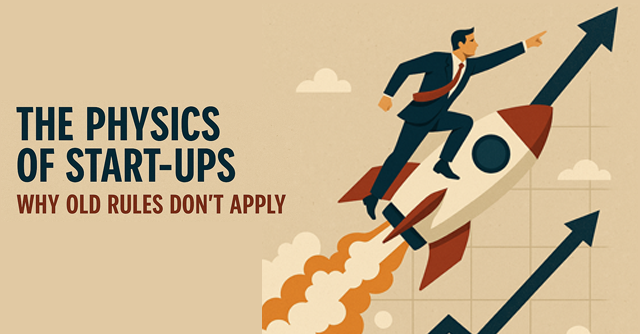
The physics of start-ups: Why old rules don’t apply


Start-up success isn’t about tech or market size—it’s about changing human behaviour. Here’s why that’s so hard
The start-up world is filled with dazzling ideas and bold claims. From futuristic mobility devices like the Segway to internet-connected juicers like Juicero, the promise is to ‘change the world’. Yet, despite the hype, many such ventures fade quickly. In contrast, platforms such as Meesho have quietly made a massive impact without relying on cutting-edge technology or bold predictions. Their success lies in something fundamental: Seamless integration into people's lives.
This contrast highlights a critical insight often overlooked by seasoned professionals moving from corporate boardrooms into the start-up space. In the corporate world, the rules are like classical physics—logical, predictable, and governed by well-understood principles. But in the start-up universe, those rules no longer apply. Cats are both dead and alive. Just as classical physics can’t explain subatomic behaviour, corporate logic does not map neatly onto early-stage ventures.

Starting up depends on changing behaviours
Start-up founders are often obsessed with product features. Yet a start-up’s success rarely hinges on features, roadmaps, or even market potential alone. The real question is: will users change their behaviour to make space for this product in their lives?
Without that behavioural shift, there is no adoption. And without adoption, even the most elegant solution will stall.

Still, pitch decks continue to focus on trends, Total Addressable Market (TAM) estimates, and revenue projections. These may be useful for investor conversations but offer little guidance in the early stages. The true challenge lies in understanding and enabling human change —specifically, the moment when a user decides to break a habit and form a new one around the start-up’s solution.
Why is behaviour change hard?
Humans are creatures of habit. Even when a system is inefficient or frustrating, people often choose familiarity over change. There’s a reason we say, “If it isn’t broken, don’t fix it.”

You’ll often hear:
• “I hate my bank… but switching is too much hassle.”
• “This software is terrible… but at least I know how to use it.”
This behavioural inertia also explains why customer surveys can be misleading. When asked if they would like a problem solved, most people say yes. But saying yes doesn't mean they’ll actually adopt the solution. The gap between “Yes, I’d love that” and “Yes, I’ll actually use it” is vast. Great start-ups win by understanding this gap and building a bridge across it.

Understanding the forces behind behaviour change
For any behaviour change to happen, there must first be a real struggle—something painful or frustrating enough to motivate action. Once that struggle exists, two psychological forces come into play:
1. The comfort of the present — “At least I know how this works. I can manage it.”
2. The fear of the unknown — “What if this makes things worse?” “What if it’s too complicated?” “What if it doesn’t work?”

Ironically, in trying to accelerate adoption, many start-ups add more features—often increasing complexity and customer apprehension. Success lies in creating a ‘bridge’—one strong enough to pull users out of their comfort zones while reducing the anxiety of trying something new.
Until users cross the bridge, market size and competitive advantages are just theory. The real work is not just building a product—it’s enabling a shift in mindset and routine.
Key questions every start-up must answer

To drive meaningful customer behaviour change, founders must ask:
• Whose struggle are we solving?
• Have they already tried to solve it themselves?
• What hidden benefits does the current (sub-optimal) solution offer?
• What anxieties do they associate with alternatives?
• Can our solution match what currently works while offering a clear path forward?
• Are the trade-offs we’re asking them to make truly justified?
Start-ups that can answer these questions—and design for adoption—are the ones that succeed.
No Techcircle journalist was involved in the creation/production of this content.

Manoj Mohan
Manoj Mohan is the Executive Director of WISE Tech at the S.P. Jain Institute of Management & Research (SPJIMR).
